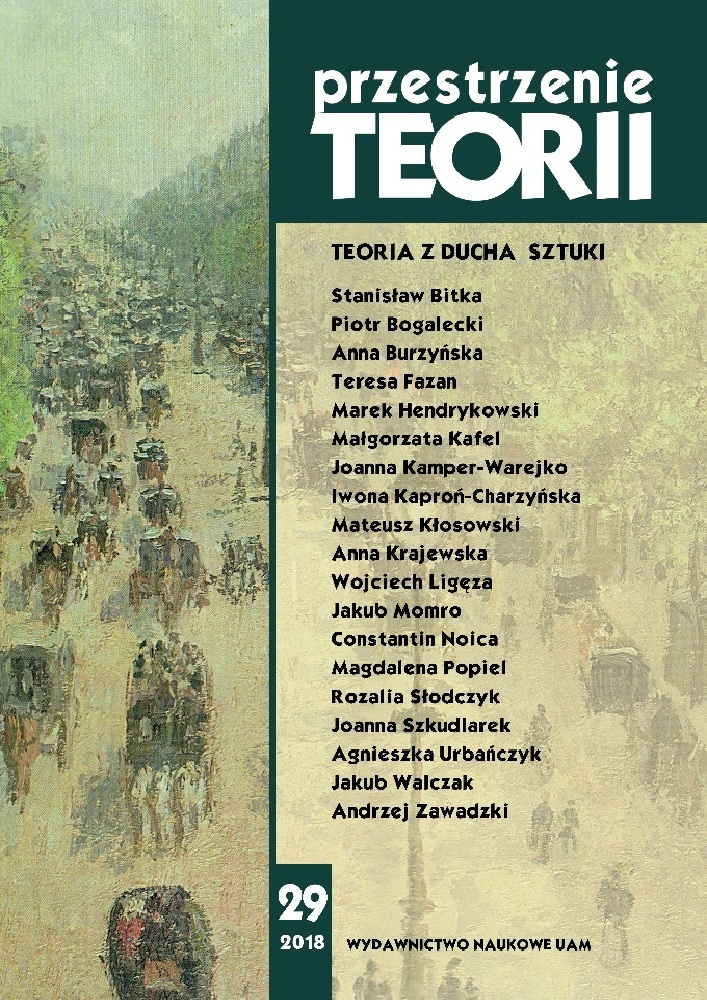Abstract
Though the area of fan studies has been a prolific field of research for almost three decades, it is still marginal in Poland. The purpose of this paper is not to present types of fan activity, but to discuss the way they are researched and how this research was influenced by ethnography, Pierre Bourdieu’s Critical Theory and cultural studies (especially reception studies). The classic works of fan studies have established a still dominant paradigm of the political and subversive character of fan activity, which is followed by a notion of fandom as a heterotopia. In order to continue the research, it has been necessary for academics to establish a position of involvement instead of distance and to create ethical guidelines preventing fans from being colonized as the Other. However, that may cause petrification of fan studies.References
Bacon-Smith C., Enterprising Women: Television Fandom and the Creation of Popular Myth, Philadelphia 1992.
Bourdieu P., Dystynkcja. Społeczna krytyka władzy sądzenia, przeł. P. Biłos, Warszawa 2005.
Bury R., Cyberspaces of Their Own: Female Fandoms Online, New York 2005.
Busse K., Hellekson K., Identity, ethics, and fan privacy, [w:] Fan Culture: Theory/Practice, eds. K. Larsen, L. Zubernis, Newcastle 2012, s. 38–56.
Evans A., Stasi M., Desperately seeking methods: new directions in fan studies research,
“Participations: Journal of Audience & Reception Studies” 2014, vol. 11 (2), s. 4–23.
Fiske J., Cultural studies and the culture of everyday life, [w:] Cultural Studies, eds. L. Grossberg,
C. Nelson, P.A. Treichler, London 1992, s. 154–173.
Fiske J., Kulturowa ekonomia fandomu, przeł. M. Filiciak, „Kultura Popularna” 2008, nr 3(21), s.17–29.
Foucault M., Inne przestrzenie, przeł. A. Rejniak-Majewska, „Teksty Drugie” 2005, nr 6, s.117–125.
Gąsowska L., Fan fiction. Nowe formy opowieści, Kraków 2015.
Gindon G., Subversion, [w:] The Encyclopedia of Literary and Cultural Theory, ed. M. Ryan, Oxford 2011, s. 867–869.
Hall S., Kodowanie i dekodowanie, przeł. W. Lipnik, I. Siwiński, „Przekazy i Opinie” 1987, nr 47–48 (1–2), s. 58–72.
Jenkins H., Textual Poachers: Television Fans and Participatory Culture, New York 1992.
Jenkins H., The Wow Climax: Tracing the Emotional Impact of Popular Culture, New York 2006.
Jenkins H., Who the &% Is Henry Jenkins?, http://henryjenkins.org/aboutmehtml/ [dostęp: 4.07.2017].
Kelley B., Toward a goodwill ethics of online research methods, “Transformative Works and Cultures” 2016, vol. 22, http://journal.transformativeworks.org/index.php/twc/article/view/891/666 [dostęp: 5.07.2017].
Kobus A., Fandom. Fanowskie modele odbioru, Toruń 2018.
Larsen K., Zubernis L., Fandom At The Crossroads: Celebration, Shame and Fan/Producer Relationships, Cambridge 2012.
Lewis L.A. (ed.), The Adoring Audience: Fan Culture and Popular Media, London 1992.
Lisowska-Magdziarz M., Fandom dla początkujących. Część I: Społeczność i wiedza, Kraków 2017.
Nowakowski A., Fanzin SF. Artyści, wydawcy, fandom, Poznań 2017.
Siuda P., Fanfiction – przejaw medialnych fandomów, [w:] Człowiek a media. Obserwacje – wizje – obawy, red. W. Gruszczyński, A. Hebda, Warszawa 2007, s. 143–157.
Williams R., The Long Revolution, London 1961.
Źródła internetowe
https://www.fanfiction.net/ [dostęp: 5.07.2017].
http://archiveofourown.org/ [dostęp: 5.07.2017].
License
Authors
Authors of texts accepted for publication in Przestrzenie Teorii are required to complete, sign and return to the editor's office the Agreement for granting a royalty-free license to works with a commitment to grant a CC sub-license.
Under the agreement, the authors of texts published in Przestrzenie Teorii grant the Adam Mickiewicz University in Poznań a non-exclusive, royalty-free license and authorize the use of Attribution-NonCommercial-NoDerivatives 4.0 International (CC BY-NC-ND 4.0) Creative Commons sub-license.
The authors retain the right to continue the free disposal of the work.
Users
Interested Internet users are entitled to use works published in Przestrzenie Teorii since 2015, for non-commercial purposes only, under the following conditions:
- attribution - obligation to provide, together with the distributed work, information about the authorship, title, source (link to the original work, DOI) and the license itself.
- no derivatives - the work must be preserved in its original form, without the author's consent it is not possible to distribute the modified work, such as translations, publications, etc.
Copyrights are reserved for all texts published before 2015.
Miscellaneous
Adam Mickiewicz University in Poznań retains the right to magazines as a whole (layout, graphic form, title, cover design, logo etc.).
